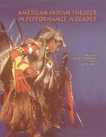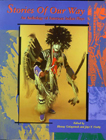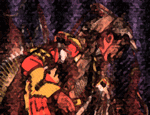 |
|
Performing Arts and the Tribes in the New Millennium
Welcome to the 2nd Annual Project HOOP Native American Theater and Performing Arts Conference here at the University of California-Los Angeles.
Project HOOP, as its name suggests, is a national, multidisciplinary initiative to advance Native theater artistically, academically, and professionally. Project HOOP, originally funded by the W. K. Kellogg Foundation, is currently funded by the US Department of Education’s Fund for the Improvement of Post-secondary Education (FIPSE), and seeks to establish and develop academic and artistic programs in the field of Native theater. The purpose and overarching goal of Project HOOP is to establish Native theater as an integrated subject of study and creative development in tribal colleges, Native communities, K–12 schools, and mainstream institutions, based on Native perspectives, traditions, views of spirituality, histories, cultures, languages, communities, and lands.
Native theater is perhaps one of the most viable Native traditional art forms for tribal communities and educational settings because of its high interest level for students, its high degree of grassroots community involvement, the versatility for unique tribal expression and cultural generation, and the potential for economic development. Through the advancement of Native theater programs, Project HOOP looks to the development of powerful cultural, spiritual, and economic pipelines throughout interested tribal colleges and communities and opportunities for Native students and community members to assume leadership roles in community, regional, and national theater, film, and television.
To advance scholarship in Native theater, the UCLA American Indian Studies Center published three edited volumes for use with these models: Stories of Our Way: An Anthology of American Indian Plays (1999) and American Indian Theater in Performance: A Reader (2000), both edited by Hanay Geiogamah and Jaye T. Darby, and Keepers of the Morning Star: An Anthology of Native Women’s Theater (2002), edited by Jaye T. Darby and Stephanie Fitzgerald.
Project HOOP is the only comprehensive Native theater, education, and community development program of its kind in the United States. It offers a wide range of integrated academic, artistic, and cultural models for theater by, for, and about Native Americans, based on Native performing arts forms and infused with traditional ceremonial purposes. Because of its broad vision and inclusive approach, Project HOOP continues to generate a high degree of national interest among tribal communities and Native theater artists.
Project HOOP Co-Directors:
Hanay Geiogamah
Professor of Theater
UCLA
Jaye T. Darby
Assistant Professor of Education
San Diego State University
WELCOME RECEPTION
Wednesday, June 4, 2003, 6:00-8:30pm
Canyon Room Holiday Inn/Brentwood-Bel-Air

The UCLA American Indian Studies Center and the UCLA Department of Theater welcomes attendees to the 2nd Annual Project HOOP Native American Theater and Performing Arts Conference
BOOK SIGNING EVENT INCLUDED
KEEPERS OF THE MORNING STAR: AN ANTHOLOGY OF NATIVE WOMEN'S THEATER
Edited by Jaye T. Darby and Stephanie Fitzgerald
Project HOOP greatly appreciates the following support:
- UCLA American Indian Studies Center
- UCLA Department of Theater
- W.K. Kellogg Foundation
- U.S. Department of Education's Fund for the Improvement of PostSecondary Education (FIPSE)
- FOX Entertainment
Thursday, June 5, 2003
General Session: 9:30-11:30am
Canyon Room Holiday Inn/Brentwood-Bel-Air
Forming Alliances: Academic, Non-profit Sector and International Theater Communities
Making connections and developing collaborations with established organizations can benefit Native theater and preforming arts initiatives and broaden a base of needed resources to infuse our creative efforts. This session will explore avenues to identify and form alliances in order to stage more Native artistic work.
Moderator: Hanay Geiogamah
Panelists: Elizabeth Theobald-Richards, Randy Reinholz, Marcie R. Rendon, Joe Cross
Box Luncheon: Noon-1pm
Breakout Session I: 1:00-2:30pm
First Floor Haines Hall
Native Theater, Film and Television: Synergy and Innovation
A growing number of "cross-training" areas within theater, film and television are available for the aspiring artist. This session will look at how artists can fine-tune their skills through "cross-training."
Moderator: Mark Anthony Rolo
Panelists: Marjorie Tanin, Heather Rae, Georgina Lightning, Jane Lind, Brian Wescott, Michael Horse, Kimberly Norris
Breatout Session II: 1:00-2:30pm
AISC Conference Room
Native Performing Arts & Youth: Projections for a Living Future
It is critical to promote theater and performing arts among our youth. Native youth share their views on why they believe theater can play a significant role in perpetuating our culture and communities.
Moderator: Jaye T. Darby
Panelists: Students from Haskell Indian Nations University
Breakout Session III: 2:45-4:15pm
Linguistic Conference Room
American Indian Dance as Theater
Tribal dances have always been infused with "story." By envisioning traditional and new styles of dance as theatrical story, and developing dance theaters, we can find innovative ways to stage our stories.
Moderator: Hanay Geiogamah
Panelists: Members of the American Indian Dance Theater
Native Performance Night
Canyon Room Holiday Inn/Brentwood-Bel-Air
Dinner Served at 6:00pm
Native Actor's Showcase
Featuring Performances From Some of Today's Most Accomplished Native Actors
"Wicked Ancestors"
A Reading of a New One Person Play by Mark Anthony Rolo
Friday, June 6, 2003
General Session: 9:30-11:30am
1350 MacGowan Hall
Developing Theater in Native Communities: The Role of Native Performing Arts in Building Community
Storytelling was once key in maintaining strong communities. Story informed tribal members of their place, their beginnings, their present path and the journey ahead. In this session Native artists discuss the need for more Native community theater and creative ways to staging local productions to strengthen Native communities today.
Moderator: Marcie R. Rendon
Panelists: Mark Anthony Rolo, Jana Rhodes, Hanay Geiogamah
Box Luncheon: Noon-1:00pm
Performance Labs
(Note: Each Lab Repeats)
1:00-3:00pm and 3:15-5:15pm
|
I. Directing
1340 MacGowan Randy Reinholz |
III. Acting
2330 MacGowan Jane Lind & Michael Horse |
|
II. Producing
102 MacGowan Hanay Geiogamah & Jean Bruce Scott |
IV. Writing
2534 Melnitz Marcie R. Rendon & Bruce King |
Native Performance Night
Dinner served at 6:00pm
Hacienda Room/UCLA Faculty Lounge
The American Indian Dance Theatre performs at Korn Convocation Hall
UCLA Anderson School of Business, 8:00pm
Saturday, June 7, 2003
General Session: 10:00am-Noon
1330 MacGowan Hall
Reality Check: Where Are We Now? Where Can We Go?
2nd Annual Project HOOP Native American Theater and Performing Arts Conference Presenters
JOE CROSS and DONNA COUTEAU are performing partners in Leaf Arrow Storytellers based in New York City.
JAYE T. DARBY is the co-founder and co-director of Project HOOP. She is a professor of education at San Diego State University.
HANAY GEIOGAMAH is co-founder and co-director of Project HOOP. He is the interim director of the UCLAAmerican Indian Studies Center and professor in the UCLASchool of Theater, Film and Television.
MICHAELHORSE is one of the best known American Indian actors. He received praise for his performance in Drew Hayden Taylor’s “Buz’ Gem Blues” which was produced by Native Voices at the Autry Museum in L.A.
BRUCE KING is an American Indian playwright and director. He has written more than fifteen original plays over the past decade, all of which have been produced by Native theater companies.
GEORGINA LIGHTNING is an actress, writer and producer. She is the mother of three very accomplished young American Indian actors.
JANE LIND is a professional actress and original member of the American Indian Theatre Ensemble in New York city. She is actively engaged in teaching various aspects of Native performing arts in tribal communities across Indian country.
HEATHER RAE is an independent filmmaker. She served as coordinator of the Native American program at the Sundance Film Institute from 1996 to 2002.
RANDY REINHOLZ is the artistic director of the NativeVoices program at the Autry Museum in Los Angeles. He is a professor of theater at San Diego State University.
MARCIE R. RENDON is an American Indian playwright, poet and lyricist based in Minneapolis. Her work has been staged throughout the country in diverse communities.
JANA RHODES is co-artistic director of the Tulsa Indian Actors Workshop.
ELIZABETH THEOBALD-RICHARDS recently joined the Ford Foundation in New York City.
MARK ANTHONY ROLO is an American Indian playwright.
JEAN BRUCE SCOTT is a Native Voices producing partner with Randy Reinholz.
MARJORIE TANIN is a Los Angeles-based actress and casting director. She has worked on casting numerous productions for film and television.
BRIAN WESCOTT holds a doctorate degree in American Studies from PrincetonUniversity. He is an active producer, director and actor in Los Angeles.
AMERICAN INDIAN DANCE THEATRE
Leah Bender, Rudy Bob, Adrian Cross, Eva Duncan, Kevin Haywahe, Marla Mahkinetas, Dallin Maybee, Lisa Odjig, Douglas Scholfield, Josette Wahwasack, Jason Whitehouse
HASKELL INDIAN NATIONS UNIVERSITY *
Tony Bell, Rhondelle Emery, Jennie James, Sara Keeton, Robin Kills the Enemy, Elizabeth Rain King, Sara Ortiz, Ashley Priddy, Thomas Yeahpau, Daryl Young.
* Project HOOP conducts a summer theater workshop at Haskell for Native college students interested in theater. Pat Melody, professor of theater at Haskell, directs the workshop.
Studies in American Indian Theater

Keepers of the Morning Star: An Anthology of Native Women's Theater
Keepers of the Morning Star: An Anthology of Native Women’s Theater showcases the exciting range of Native women’s theater today from the dynamic fusion of storytelling, ceremony, music, and dance to the bold experimentation of poetic stream-of-consciousness and Native agit-prop. While negotiating complex issues, including family, community, repatriation, sovereignty, urban relocation, and cultural and spiritual appropriation, this collection celebrates the enduring power of Native women’s traditions to heal and transform.
386 pp.
$25 paper. ISBN 0-935626-56-5

American Indian Theater in Performance: A Reader
Edited by Hanay Geiogamah and Jaye T. Darby, 2000.
This reader is the first comprehensive collection to present the views of leading playwrights, directors, scholars, and educators in contemporary Native theater. A ground-breaking collection of recent and earlier writings, it serves as both an overview of the field and a source book for further study and performance. Locating Native theater within the rich contexts of Native communities, tribal sources of creativity, performance traditions, and artistic innovations, the articles and interviews provide historical context and offer perspectives on directing, dramaturgy, and new play development in Native theater.
414 pp.
$20 paper; ISBN 0-935626-52-2

Stories of Our Way: An Anthology of American Indian Plays
Edited by Hanay Geiogamah and Jaye T. Darby, 1999.
Stories of Our Way was the first anthology to span more than thirty years of American Indian theater, including the 1930s classic The Cherokee Night. The distinguished group of twelve plays draws on a rich range of tribal experiences—Cherokee, Choctaw, Creek, Kiowa, Navajo, Oneida, Otoe-Missouria, Rappahonack, and urban. The playwrights treat the diverse stories of Native people’s ways with gritty integrity, uncompromising honesty, and deep respect, balanced with an awareness of the challenges and responsibilities to renew, and a commitment to an evolving American Indian theatrical aesthetic. The playwrights invite audiences to probe the often-painful past, share the enduring values of family, community, and tribe, and celebrate humor and spirituality.
503 pp.
$20 paper; ISBN 0-935626-50-6
$60 hardcover; ISBN 0-935626-49-2

